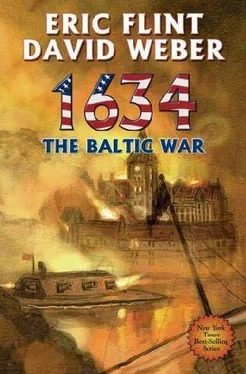Eric Flint - 1634 - The Baltic War
Здесь есть возможность читать онлайн «Eric Flint - 1634 - The Baltic War» весь текст электронной книги совершенно бесплатно (целиком полную версию без сокращений). В некоторых случаях можно слушать аудио, скачать через торрент в формате fb2 и присутствует краткое содержание. Жанр: Альтернативная история, на английском языке. Описание произведения, (предисловие) а так же отзывы посетителей доступны на портале библиотеки ЛибКат.
- Название:1634: The Baltic War
- Автор:
- Жанр:
- Год:неизвестен
- ISBN:нет данных
- Рейтинг книги:5 / 5. Голосов: 1
-
Избранное:Добавить в избранное
- Отзывы:
-
Ваша оценка:
- 100
- 1
- 2
- 3
- 4
- 5
1634: The Baltic War: краткое содержание, описание и аннотация
Предлагаем к чтению аннотацию, описание, краткое содержание или предисловие (зависит от того, что написал сам автор книги «1634: The Baltic War»). Если вы не нашли необходимую информацию о книге — напишите в комментариях, мы постараемся отыскать её.
1634: The Baltic War — читать онлайн бесплатно полную книгу (весь текст) целиком
Ниже представлен текст книги, разбитый по страницам. Система сохранения места последней прочитанной страницы, позволяет с удобством читать онлайн бесплатно книгу «1634: The Baltic War», без необходимости каждый раз заново искать на чём Вы остановились. Поставьте закладку, и сможете в любой момент перейти на страницу, на которой закончили чтение.
Интервал:
Закладка:
Jesse had kept trying, even to the point of resigning as a partner in the aircraft firm, but it hadn't been enough. The powers-that-be, in their wisdom, had seen fit to authorize assistance to both firms in the form of "a suitable building, strategic materials, and such labor and facilities as are deemed necessary by the strategic resources board for aircraft construction." And so, while Hal and his workers had used the assistance to move construction of the "Gustav" model into high gear, the Kelly Aircraft Company had moved into their new digs-and, so far at least, had shown precious little for it.
But it was a done deal, so Jesse let it go. He turned his attention to the aircraft shelters he was passing, five completed now and one in progress. Three had aircraft in them, a Belle and two of the new Gustavs, low wing, powerful looking birds. Their ground crews were still working on them in the lowering sunlight, busy, purposeful. The Belle ground crew was fueling their aircraft from a horse drawn fuel bowser. At the next shelter over, the crewchief of Gustav I, Sergeant Hiram Winters, noticed Jesse and raised a hand. Jesse smiled and raised his own hand in greeting before he moved on.
Good kids, he smiled. Good aircraft. Thank you, God, for both.
He neared an airman lounging on a small tractor near the landing zone. With two hundred and thirty-five men and women now on the rolls, he no longer worried about manpower to work on the field, though the constant effort required brought to memory the old British secret for a nice lawn: good seed, plenty of water, and rolled daily for three hundred years. To that end, the tractor had a roller in tow. Filling in and smoothing out the ruts made in the runway's landing zone was a routine end-of-flying-day chore. He waved his hand down as the young man made to get off his machine.
"Good evening, Airman…" He looked for the airman's nametag.
"Guten abend, Herr Oberst. Mein name ist Fleischer. 'Gus' Fleischer."
"Fleischer." Jesse put his hands in the small of his back and stretched. "Waiting for the last aircraft?"
"Jawohl… I mean, 'Yes sir,' " Fleischer replied.
Jesse checked his watch. "Soon, I think. How long have you been with us, Fleischer?"
"Drei, uh, three month, Herr Colonel," Fleischer said slowly.
"And driving already, huh? Very good."
"Yes, sir." The young man lifted his chin. "I will be a pilot, someday." He lifted his arm and pointed. "Look, Herr Oberst! Er kommt!"
"Yes, he does," said Jesse, watching the Belle III slide over the field boundary and touch down. He clapped the airman on the shoulder. "Study hard, Gus, eh?"
"Ja, Colonel!" The young German nodded, started the tractor, and drove off proudly to his duty.
Chapter 2
Magdeburg, on the Elbe River Capital of the United States of Europe
"Short handed again," Thorsten Engler muttered to himself, as he counted those still out sick. Fortunately, all they had to do at night was keep the furnace running until morning. Things were usually pretty quiet, although one time the gas had started to run out, and he'd had to scramble to unload the coke and load new coal in several retorts. That could be the case tonight, with the cold and the snow increasing demand for heat.
Being the recently promoted foreman for the night shift at the coal gas plant-which was almost as new as he was-Engler always tried to walk around the plant every hour, whether it was clear, rain, or snow. It was the only way to make sure everyone was awake, and it tended to keep him awake as well. Despite the snow falling, the plant was mostly clear. That was probably due to the heat of the furnace, and maybe some shoveling as well. He'd have to make sure that they continued that during the night, or he'd look bad in the morning when the plant manager arrived.
He walked around the plant, looking at the furnace and the machinery. As he had many times by now, he wished he knew more about the manufacturing processes involved in the operation. It had only been a month since the plant officially opened. He had trained for it and even helped build it, but no one here had ever seen such a collection of machinery before.
To make the situation worse, his training had been narrowly focused on the job of repairman he'd been originally hired on for, not the more general training a supervisor should get. Neither he nor the plant management had expected him to become a foreman almost as soon as he started. That was another effect of the influenza that was ravaging the city. The original foreman had been a much older man. He'd died from the disease just three weeks ago.
Everything looked good, though, so far as Thorsten could tell. He was about to head inside when he heard a faint high-pitched whistle. That was odd, he thought. The wind didn't seem strong enough for that.
But, not seeing anything amiss, he went into his office to catch up on his paperwork. With all the men out sick because of the influenza, the work records were more of a tangle than usual.
A couple of hours later, one of the workmen came into the office. That was Eric Krenz, who served the night shift as its crane operator. Since they still didn't have a full-time repairman on night shift, he also helped Thorsten in that capacity. Both single men in their mid-twenties, they'd become quite good friends in the short time since they'd started working together.
"Something's wrong, Thorsten," Krenz said. "The street lamps seem to be going out."
Thorsten quickly went outside. The lights were indeed dimming. Those farther away from the plant were already out.
"Shit. There'll be a lot of pissed people soon. Did we run out of gas?"
"I don't think so," said Eric. "It's only been two or three hours since we started this batch. I don't know what's going on."
Engler decided to start at the beginning, with the coal loading operation. That was being handled by Robert Stiteler these past few days. Stiteler was an Alsatian, one of the many immigrants who'd arrived in Magdeburg over the past year. He normally helped Krenz operate the steam-powered crane that moved the kegs containing the coal tar products and ammonia water. But with so many of the men off sick, he'd agreed to handle loading the coal instead. It was back-breaking work, using a shovel instead of a steam crane, but he'd done a fine job with it. He'd kept the coal going in and the coke going out, which was what mattered.
When Engler appeared in the furnace room, with Krenz in tow, Stiteler broke off from his work and leaned his shovel against one of the stanchions that supported the furnace room's walls and roof. As a safety measure, the stanchion was much thicker and sturdier than it really needed to be. The furnace "room" was really a big shed, with walls and a roof made of thin planks just thick enough to handle rain and snow.
"Evening, Thorsten," he said pleasantly. As was true of the most of the men working in the plant-anywhere in Magdeburg-the Alsatian immigrant had quickly adopted the informality favored in work places by the American up-timers. All the more so since the Committees of Correspondence who were almost a separate, informal government in the capital city insisted on it as a matter of principle. They had members everywhere, especially in the ranks of the industrial workers and their unions. Thorsten wasn't a member of the CoCs himself, simply because he'd been too busy for the meetings involved. But his friend Eric Krenz belonged, as did perhaps a fourth of the workmen in the plant.
"Evening, Robert," he said, trying to be just as pleasant but wanting to get on to the problem at hand. Normally, he would have taken the time to chat idly with Stiteler for a minute or two, just to give the man a legitimate excuse to take a rest from the grueling labor of shoveling coal down the chute into the retorts. "We seem to be losing gas somewhere along the way. Are you having any problems?"
Читать дальшеИнтервал:
Закладка:
Похожие книги на «1634: The Baltic War»
Представляем Вашему вниманию похожие книги на «1634: The Baltic War» списком для выбора. Мы отобрали схожую по названию и смыслу литературу в надежде предоставить читателям больше вариантов отыскать новые, интересные, ещё непрочитанные произведения.
Обсуждение, отзывы о книге «1634: The Baltic War» и просто собственные мнения читателей. Оставьте ваши комментарии, напишите, что Вы думаете о произведении, его смысле или главных героях. Укажите что конкретно понравилось, а что нет, и почему Вы так считаете.











